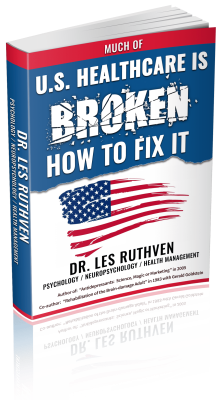Last updated on January 31st, 2024 at 10:17 am
By: Leslie (“Les”) Ruthven, Ph.D. in clinical psychology
Email: dr.les.ruthven@gmail.com
Health blog: www.ruthvenassessments.com
When the first DSM was being prepared several dozen psychologists were quite involved in its development but I knew psychiatry would have the last word in the final product. I and many other psychologists argued against participation of the psychology profession in creating the DSM and argued that psychology should create its own “classification system” since the profession knew then as now (DSM-1—5) that diagnosis of mental disorder was based strictly on the patient’s behavior and not the patient’s biology. Psychologists had the skills and expertise to develop such a system but not the access to the money to develop one. Psychiatry and the DSM won out and I believe the DSM outcome is largely responsible for so much poor mental health treatment today. I know modern psychiatry believes it has identified biological indicators of these disorders (e.g. dopamine for schizophrenia and serotonin for depression) but these are only speculations and not backed up by sound scientific evidence. Before the development of the DSM general (non-psychiatric) physicians would not have dared to treat patients with mental health problems because of their lack of training and rightly so. With the DSM general physicians and modern psychiatry were now able to go to the DSM, check off the patient’s symptoms and behaviors, and with the approval of psychiatry and the pharmaceutical industry prescribe the appropriate drug for the diagnosis! With the mental disorders diagnosis and treatment of the mental disorders becomes just like general medicine. Approval for this new conception of the mental health problems came from several sources including the not for profit Mental Health Associations who were spreading the news that mental health problems were no different than medical problems; moreover, with the new psychiatric drugs most mental health problems we are told can now be treated effectively by your doctor with medication. A consequence of this new revision of the mental disorders is that non-psychiatric physicians and other medical professionals, even including pharmacists with special training in psychiatric drugs, have in the U.S. become the largest “mental health” profession in the country with little or no formal training in understanding and treating the mental disorders except with drugs. I believe the DSM is a classification system and not a diagnostic system of the mental disorders. For example’ let’s take a look at the many DSM “diagnoses” under the general heading depression and anxiety. Before going forward I would like to present some data from my behavioral health management firm for employer self-insured employee health plans. Unlike the industry standard for a member to obtain care the member on an 800 number called my firm and had a 30 minute or more assessment and recommendations with a staff senior level clinical psychologist. Before referring the patient to further care the psychologist, on the basis of the discussion, gave the patient some direction the patient might consider in helping to resolve the presenting problems. Unexpectedly about 15 to 20 percent of the callers felt they could handle the problems themselves without further professional help. Of more than 100,000 callers about 65% reported basically depressive and/or anxiety symptoms. I assume in general medicine one can go from a diagnosis (e.g., Type 2 diabetes) to its treatment but can we do the same thing with the mental disorders? General physicians and most psychiatrists say we can (the typical prescribed treatment is a drug) but having treated depression and anxiety patients for 20 years I say of course not! I think the truism is correct: if you have seen one depressed patient in therapy (and also one anxious patient) you have seen only one case of depression or one case of anxiety. To make a mental health diagnosis involves the ability of the psychotherapist to understand what it is about the patient (the personality, current maladaptive relationships, life stresses and other psychosocial factor) that are giving rise to or causing the patient’s distressing symptoms! To treat the symptoms you must treat the causes giving rise to the symptoms. The DSM “diagnosis” does not tell the provider (general physician, psychologist, other therapist) what to do for the patient despite what most physicians and most psychiatrists believe. A 7 to 10 minute office visit of a patient with a mental disorder by a physician cannot be correctly diagnosed or treated since the medically trained professional is completely in the dark about the causes of the patient’s mental health problems.
To improve the current system of much of “back end” MH treatment, that is, psychiatric drugs to treat mythical brain diseases by medically trained professionals, we have to treat the causes of the patient’s MH difficulties by health professionals trained to diagnose and treat the patient’s problems. The only current health entity capable of making my proposed major changes in the health plan are the employer sponsored self-insured employee health plans. Self-insured plans can brings about these changes through the power of payment but these plans will need educating such as the above.



